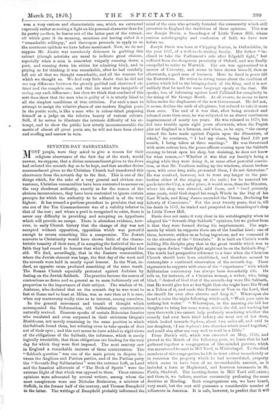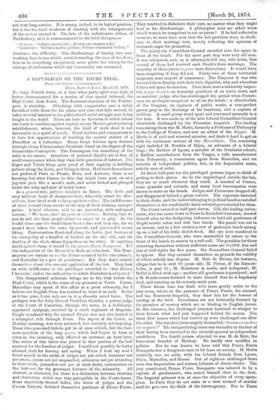SEVENTII-DAY SABBATARIANS.
MOST people, were they asked to give a reason for their IU religious observance of the first day of the week, would answer, we suppose, that a divine commandment given to the Jews had ordered the seventh day so to be kept, and that another divine commandment given to the Christian Church had transferred this observance from the seventh day to the first. This is one of the things which, for the sake of a very general and obvious con- venience, Christian communities have been contented to assume on the very slenderest authority, exactly as for the reason of the obvious inconvenience, they have been contented to ignore certain precepts for which the authority to be adduced is of the very highest. It has seemed a perilous precedent to proclaim that any one out of the Ten Commandments was of a validity inferior to that of the rest ; and where a peril is recognized to exist, there is never any difficulty in providing and accepting an hypothesis which will provide an escape. There is abundant evidence, how- ever, in early Church history that the change of day was not accepted without opposition, opposition which was powerful enough to secure something like a compromise. The Jewish converts to Christianity would have shown little of the charac- teristic tenacity of their race, if in accepting the festival of the new faith they had ceased to honour that which had distinguished the old. We find, accordingly, that in the Eastern communities, where the Jewish element was large, the first day of the week and the seventh were held in nearly equal honour. In the West, in- deed, an opposite cause produced something of the same result. The Roman Church especially protested against Judaism by fasting on the Jewish Sabbath. The practice became the source of contentions so fierce and so general as to seem ludicrously out of proportion to the importance of their subject. The wisdom of St. Ambrose, who declared that on the seventh day he was wont to fast at Rome and to feast at Milan, was as rare then as it is rare, when any controversy really stirs us to interest, among ourselves.
In the general movement and tumult of thought which accompanied the Reformation, old Sabbatarian controversies naturally revived. Erasmus speaks of certain Bohemian fanatics who -emulated and even surpassed in their strictness Origen's Dositheans, not merely remaining in the same position in which the Sabbath found them, but refusing even to take specks of dust out of their eyes ; and this sect seems to have added to rigid views of the obligations of the Sabbath, the inference, which is surely logically irresistible, that these obligations are binding for the very day for which they were first imposed. The next century saw in England a remarkable increase of these controversies. The "Sabbath question" was one of the main points in dispute be- tween the Anglican and Puritan parties, and of the Puritan party the "Seventh-Day Sabbatarians" were the extreme Left, as Laud and the fanatical adherents of "The Book of Sports" were the extreme Right of that which was opposed to them. These extreme opinions were advocated by several writers, among whom the most conspicuous were one Nicholas Braboune, a minister of Suffolk, in the former half of the century, and Thomas Bampfield in the latter. The writings of Bampfield probably influenced the
mind of the man who actually founded the community which still preserves in England the traditions of these opinions. This was one Joseph Davis, a linendraper of Little Tower Hill, whose curious autobiography and confession of faith we have now before us.
Joseph Davis was born at Chipping Norton, in Oxfordshire, in the year 1627, of a well-to-do trading family. His father "in-
clined to take the Parliainent'e side after Edgehill fight," but suffered from the dangerous proximity of Oxford, and was finally compelled to retire to Warwick. The son was apprenticed to a mercer of Coventry, and seems to have shown himself, then as afterwards, a good man of business. Here he lived in peace till the Restoration. He writes in strong terms about the coalition of parties which led to the bringing-back of the King, and it is not unlikely that he used the same language openly at the time. He speaks, too, of informing against Lord Falkland for complicity in the rising of Sir George Booth. At all events, he seems to have fallen under the displeasure of the new Government. lie did not, it seems, decline the oath of allegiance, but refused to take it more than once. The end of it was that, after being arrested and released more than once, he was subjected to an almost continuous imprisonment of nearly ten years. lie was released in 1670, but fell into trouble again eight years afterwards, when the Popish plot set England in a ferment, and when, as he says, "the enemy turned the laws made against Papists upon the Dissenters, of which," he continues, " I had my share, being fined £,20 per month, I being taken at three meetings." He was threatened with more serious loss, the peace officers coming upon the Sabbath evening to break open his shop, but desisting, he does not know for what reason,—" Whether it was that my family's being a singing while they were doing it, or some other powerful convic- tion, or that Mr. Tomlison nailing up the windows, almost broken open, with some long nails, prevented them, I do not determine." He was resolved, however, not to trust any longer to the pro- tection either of the singing or the nails ; for he removed his goods into the City, a safer place, it would seem, than the Minories, where his shop was situated, sold them, and " lived privately some years, until God stayed his rough Winds in the Day of his East Winds, and King James ascended the Throne, Declaring for Liberty of Conscience." For the next twenty years, that is, till his death in 1707, he traded and prospered in a linendraper's shop in Little Tower Hill.
Davis does not make it very clear in his autobiography when he adopted his" Seventh-Day-Sabbath" opinions, but we gather from it that they were formed during his imprisonment. The argu- ments by which he supports them are of the familiar kind ; one of them, however, strikes us as being ingenious, and we commend it to the attention of the "literalists." It is built on Christ's words bidding His disciples pray that in the great trouble which was to come upon Judma " their flight might not be on the Sabbath-Day." The words had prospective reference to a time when the Christian Church should have been established, and therefore seemed to contemplate a continued observation of the seventh day. These arguments he supports with some of the "experiences" with which Sabbatarian controversy has always been remarkably rife. Ho tells us, for instance, of a Christian woman, a widow, who, being blind, "desired of God that if the seventh-day were His Sabbath, that He would give her so her Sight that she might have his Word as a Token of it, and made this Promise or Vow to the Lord, that she should for ever after observe and keep it." Whereupon she heard a voice the night following which said, "Wash your eyes in nothing but water." " W hereupon, in the morning she bid her daughter to bring her some water, which she did, and washing her eyes therewith (we cannot help profanely wondering whether the remedy had ever been tried before) she went out of her door, which looked towards Sopleant, about two miles off, and said to her daughter, 'I see .S'ophant's two churches which stand together,' and could also after see very well to read in a Bible."
From Davis's will, which was executed on May, 1706, and proved in the March of the following year, we learn that he had gathered together a congregation of like-minded persons, which was accustomed to meet in Mill Yard, in Whitechapel. To the chief members of this congregation he left in trust either immediately or in reversion the property which he had accumulated, property which seems to have been of no inconsiderable amount, as it included a farm at Maplestead, and fourteen tenements in St.
Shadwell. The meeting-house in Mill Yard still exists ; and there is, we believe, another community professing the same doctrine at Reading. Both congregations are, we have heard, very small, but the sect still possesses a considerable number of adherents in America. It is safe, however, to predict that it will not very long survive. It is strong, indeed, in its logical position, but it has the fatal weakness of clashing with the arrangements of the society around it. The fate of the unfortunate citizen of Tewkesbury, as it is commemorated in the brief dialogue,—
JUD.EUS: Sabbata sancta cob o : de atercore aurgere nob.' ..Cenusnax .Sabbata nostra quidem Solomo remancbis ibidcm,"
illustrates the difficulty. The disadvantage of having two non- working days is one which, notwithstanding the case of the Jews, here as in everything exceptional, must prove too strong for the average of enthusiasm which any community can command.



































 Previous page
Previous page